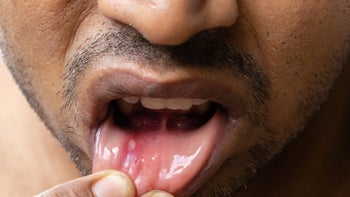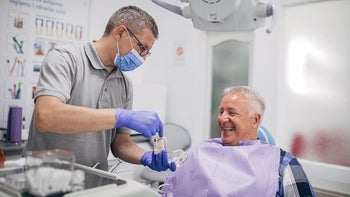
How to Ease the Pain of a Toothache (Until You Can See the Dentist)
Key takeaways:
Over-the-counter medications like ibuprofen and acetaminophen, combined with remedies like saltwater rinses and cold compresses, can ease pain while you wait for a dental appointment.
Avoid actions that might worsen toothache pain, like attempting to pull a loose tooth on your own.
You can get rid of a toothache temporarily, but it’s often a sign of underlying dental problems that require professional treatment.
Table of contents

A toothache can strike at the worst possible moment — during the weekend, late at night, or when you can’t immediately see a dentist. It’s usually your body’s way of saying that there’s a tooth or gum problem. The pain, ranging from mild discomfort to severe throbbing, can make even simple tasks feel unbearable.
If you have a toothache, it’s important to narrow down the true cause instead of waiting to see if the pain goes away. The best way to investigate is scheduling an appointment with your dentist as soon as possible. Until then, these home remedies and over-the-counter (OTC) medications can give you some short-term pain relief and help you get rid of your toothache at home.
1. Cold compress
If a tooth infection is the cause of your pain, you may also notice facial swelling. Apply a cold compress to the area off and on for the entire day. This will help slightly reduce the swelling and ease your pain. Keep an eye on your temperature during this time as well. A low-grade fever could also indicate a tooth infection.
Search and compare options
2. Ice
A tooth or gum infection can also increase inflammation. Applying ice directly onto your gums can help reduce the pain. Try taking an ice cube and rubbing it back and forth on the affected area for 2 to 3 minutes. Keep in mind that this is temporary but could offer brief relief.
3. OTC pain medications
The most effective OTC pain relief is a combination of ibuprofen (Advil, Motrin) and acetaminophen (Tylenol). For most people, it’s safe to take these medications together as instructed, alternating every 4 to 6 hours. Make sure to talk with a healthcare professional familiar with your medical history first, to ensure OTC pain relievers are safe for you to take.
4. Saltwater rinse
If it seems like your gums are the main source of discomfort, rinsing with warm salt water can help. Warm salt water has the ability to reduce harmful bacteria and may promote faster healing. Rinsing with warm salt water every couple of hours can help with gum sensitivity.
5. OTC numbing gels
Topical gels can also help alleviate gum sensitivity. You can try applying a small amount of a topical anesthetic like Orajel to temporarily numb the area of a toothache.
6. Sensitivity toothpaste
Sometimes, your toothache can be coming from generalized tooth sensitivity. Brushing with specific toothpaste that targets tooth sensitivity can help this sensation. When trying to find a tooth-sensitive toothpaste, make sure to look for toothpastes containing ingredients like potassium nitrate and stannous fluoride.
What are the most common causes of a toothache?
There are many reasons why you may experience a toothache. Here are a few possibilities:
Tooth decay
Nerve damage from tooth decay causing a tooth infection
Gum disease
Receding gum line exposing part of the root of your tooth
Tooth wear from clenching and grinding
A cracked tooth
Generalized tooth sensitivity
A broken or missing filling
Is your toothache a tooth infection? Maybe, here’s what you need to know about a tooth infection and how it’s treated.
When is a toothache an emergency? Find out when you need to consider going to the emergency room for dental care.
Free or low-cost dental care: Learn ways to save on dental care if you are uninsured.
When should you see a dentist about a toothache?
You should schedule an appointment with a dentist as soon as you start experiencing any type of toothache. If you wait to get your toothache addressed, the problem can worsen, causing more damage. In most cases, getting the problem resolved early can help prevent extensive dental treatment.
The longer you wait to see a dentist, the more money it usually costs. More expensive dental treatments are usually the result of major cavities or tooth infections. Early on, these tooth problems may not cause tooth pain. Seeing a dentist regularly can catch these issues before they cause a toothache and costly dental problems.
What is the best medication for a toothache?
There are many different medications that can help relieve a toothache. Some are accessible to everyone (OTC medications) and some need a prescription from a dentist.
OTC medications
The most popular OTC medications to control toothache pain are:
Ibuprofen (Motrin, Advil)
Acetaminophen (Tylenol)
Prescription medications
These medications your dentist may prescribe will vary based on what’s causing your toothache. Medications like antibiotics, steroids, and prescription mouthwashes are most common for dental pain.
Some of the most prescribed medications for dental pain include:
Cephalexin (Keflex)
Methylprednisolone (Medrol Dosepak)
What should you not do when you have a toothache?
Because a toothache can be caused by many different things, there are certain actions that may trigger more pain than others. Here are some things you should try to avoid:
Cold drinks (to reduce sensitivity)
Hard foods (like chips, nuts, crackers, and jerky)
Pulling a loose tooth yourself (to prevent damage to the gum tissue around the tooth)
In general, you’ll want to avoid any activities that could cause further trauma to the area when you have a toothache. Reach out to a dentist for specific suggestions on what you should avoid.
Frequently asked questions
It’s hard to know how long a toothache will last. It all depends on what’s causing the toothache and how severe it is. Sometimes a toothache will come and go for weeks. Other times, the toothache will persist and cause throbbing pain. It’s best to see a dentist as soon as possible to treat the toothache and resolve the pain.
Sometimes, a toothache will go away on its own. This doesn’t mean the problem has been treated though. Minor gum irritations tend to heal on their own, but other major dental problems require dental treatment to fully resolve. Try not to ignore a toothache and see a dentist, even if it starts to feel better.
In some cases, you can temporarily stop nerve pain in the tooth by prescription medications or OTC pain medications. But treating the cause may require dental care, such as a root canal or tooth extraction.
The bottom line
Toothaches are not just painful — they’re a sign that something in your mouth needs attention. Home remedies and OTC medications can help manage pain in the short term, but they’re not a replacement for professional dental care. The sooner you see a dentist, the better your chances of avoiding more serious issues (and expenses) down the line.
Why trust our experts?


References
American Dental Association. (2024). Oral analgesics for acute dental pain.
Aravinth, V., et al. (2017). Comparative evaluation of salt water rinse with chlorhexidine against oral microbes: A school-based randomized controlled trial. Journal of the Indian Society Pedodontics and Preventive Dentistry.
Carvalho, T. S., et al. (2020). Chapter 9: Acidic beverages and foods associated with dental erosion and erosive tooth wear. Monographs in Oral Science.
National Institute of Dental and Craniofacial Research. (2024). Bruxism.
Sharma, S., et al. (2012). Evaluation of the clinical efficacy of potassium nitrate desensitizing mouthwash and a toothpaste in the treatment of dentinal hypersensitivity. Journal of Clinical and Experimental Dentistry.

























